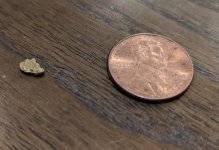GrantT
Greenie
- Jul 11, 2019
- 19
- 10
- Detector(s) used
- Fisher F75+ /w 11" DD & Magic 5x8
- Primary Interest:
- All Treasure Hunting
So, back from some holidays which included some metal detecting and gold panning and other related activities.
I did get some gold, but by winning a chili cooking competition for the panning club, not by detecting/panning (well, we did pan some light flour/dust gold).
Anyways, figured I would use the little nugget as a test object to help fine tune my skills. I dropped the little nugget in the grass (in a tiny glass vial) and it pretty well required the stock coil to be within an inch to detect it. Any ideas if that is as good as it gets? I've tried numerous settings, sensitivities, tones.
So, while the documentation seems to indicated the F75 is usable for gold prospecting, what are the real limitations? Would have to be significantly larger nuggets? Some setting I need to use specifically. Or, realistically, is this type of detecting a waste of time with an F75?

Grant
I did get some gold, but by winning a chili cooking competition for the panning club, not by detecting/panning (well, we did pan some light flour/dust gold).
Anyways, figured I would use the little nugget as a test object to help fine tune my skills. I dropped the little nugget in the grass (in a tiny glass vial) and it pretty well required the stock coil to be within an inch to detect it. Any ideas if that is as good as it gets? I've tried numerous settings, sensitivities, tones.
So, while the documentation seems to indicated the F75 is usable for gold prospecting, what are the real limitations? Would have to be significantly larger nuggets? Some setting I need to use specifically. Or, realistically, is this type of detecting a waste of time with an F75?

Grant



